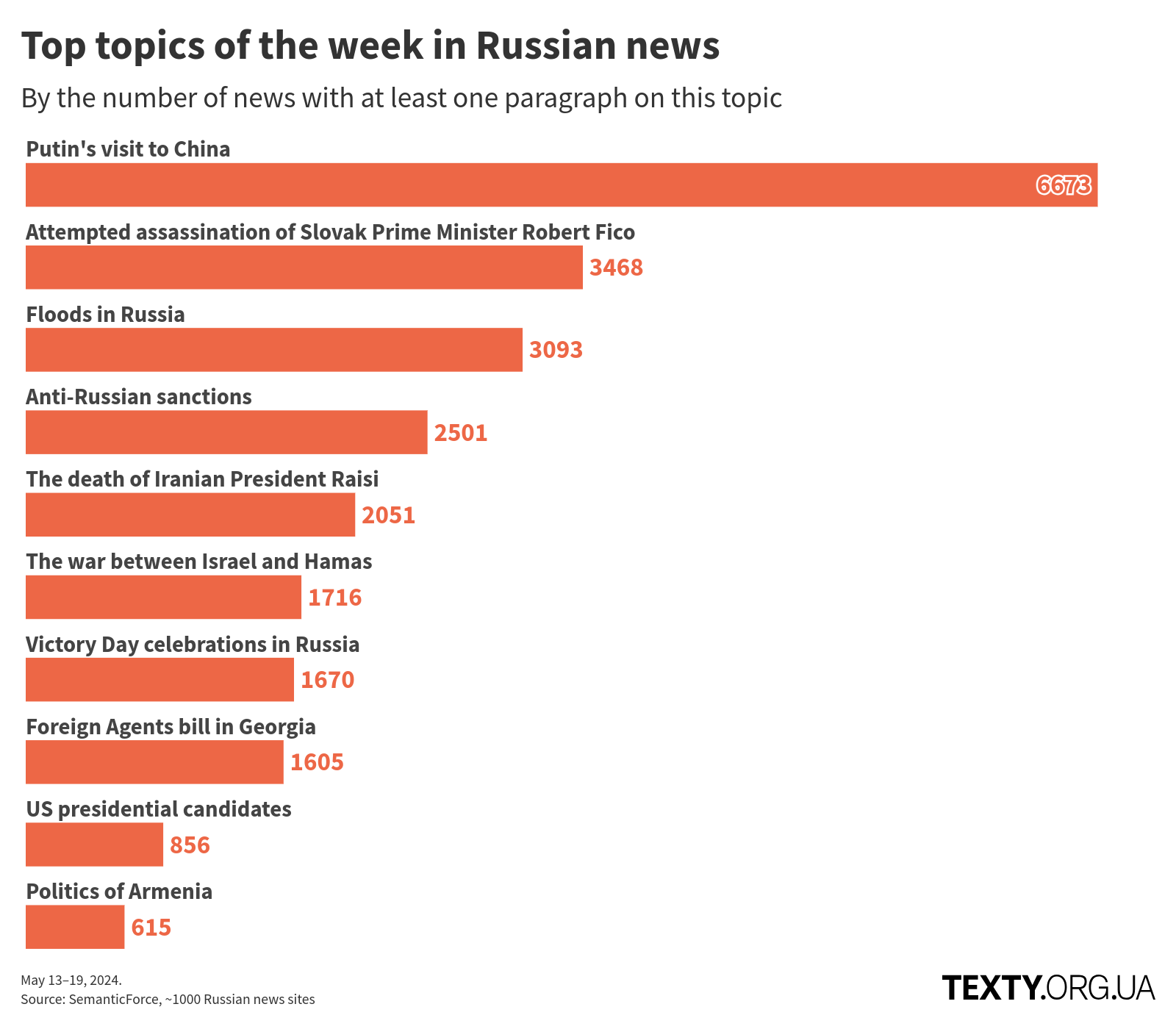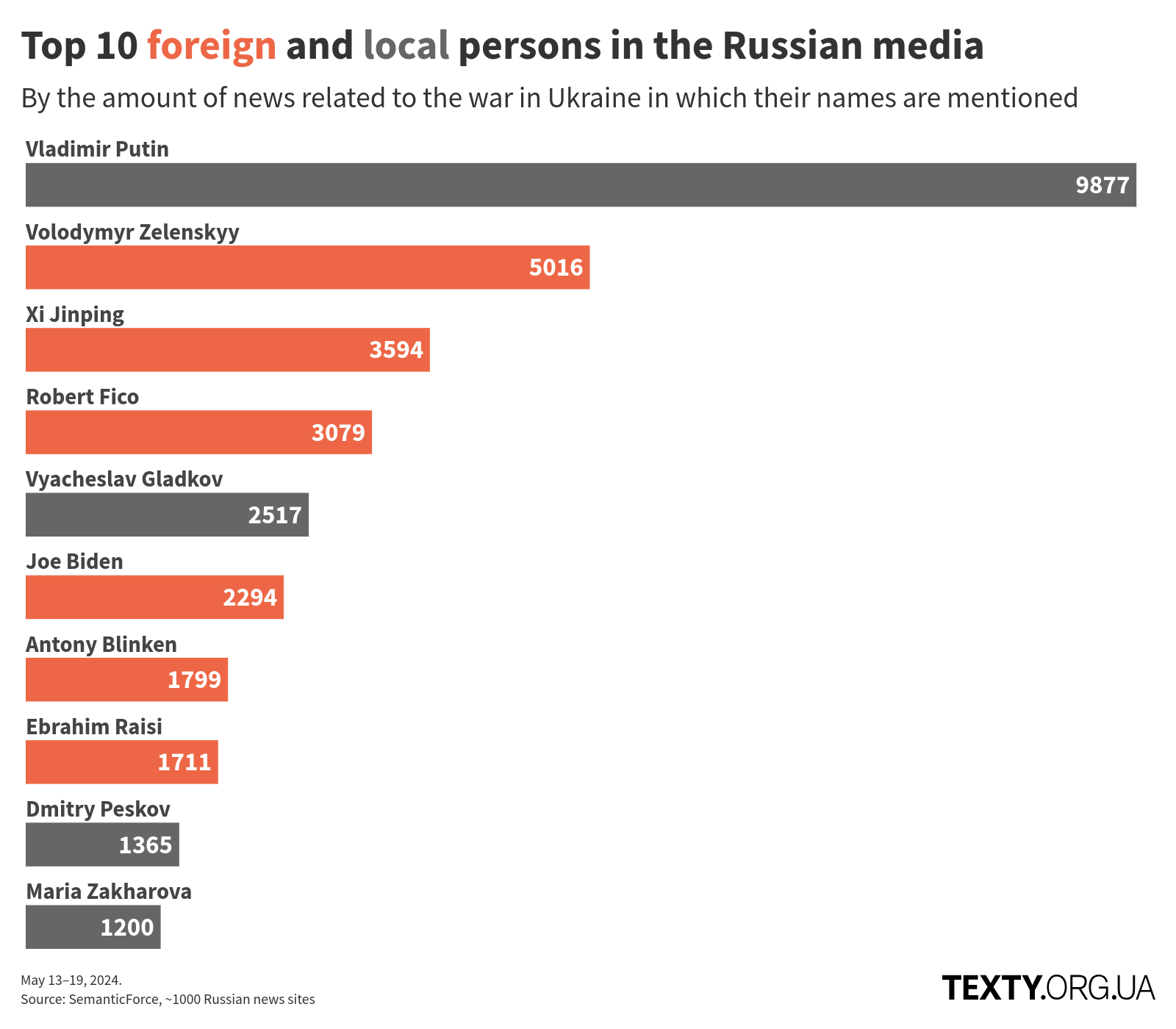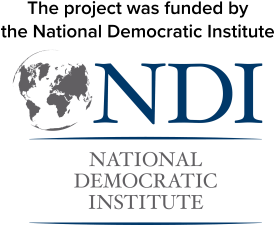Hunting for Russia's friends. Russian Media Monitoring Report, May 13-19, 2024
Last week, Russian propagandists devoted all their talents to covering Putin's visit to China. The Russian leader held a kind of international inauguration in Beijing, as China recognises Putin as the rightful leader of the state. Now, Russians are being told that the countries of the Global South will soon accept Putin. They are also trying to convince them that Russia is on par with China. The Kremlin's entire information service discusses a new monolithic alliance that will take over from the collective West.
The Russian media also reported on the troubles with Russia's friends. The Prime Minister of Slovakia was assassinated, and the President of Iran died in a plane crash. Russian propaganda has its interpretation of these events: the culprits are the intelligence services of Western countries, which eliminate anyone who wants to establish friendly relations with Russia.
Read about this and more in the new issue of our monitoring of Russian state media and manipulative websites that target Russian disinformation.

"A Russian and a Chinese are brothers forever"
Last week, the Russian media was full of excitement about Vladimir Putin's visit to China. It was his second visit to Beijing in less than a year and his first trip abroad after being "re-elected" as president of the Russian Federation.
Every step Putin took was covered. It turned out that Putin is a fan of Chinese cuisine: "Putin had previously said that Xi had treated him to Peking duck, and the president wanted to eat one piece but could not resist and ate the second. 'It was so delicious,' Putin said when asked about his favourite Chinese dish."
Putin said that the Chinese and Russians are brothers forever: "In a famous song of that time - 75 years ago, it is often sung in our [time] - there is a phrase that has become a catchphrase: "A Russian and a Chinese are brothers forever". We cannot verify whether such songs are actually sung in Russia today, but what can you not say to please the Chinese?
There was also news that the Chinese are delighted with Putin: "The appearance of Russian President Vladimir Putin has caused a resonance in China" and "Beijing residents praised Vladimir Putin's charisma and appearance". There was also some inadvertent arrogance: "They are not used to seeing charismatic politicians of such a high level".
The propaganda looks for and finds signs of the unbreakable friendship between the two countries in every detail: from how many people met Putin's plane to the flowers arranged in the room during the meeting. In the centre of the flower arrangement is an anthurium plant, a symbol of hospitality in China. This is a significant detail for propaganda. It is proof of that very friendship.
Putin's spokesman, Dmitry Peskov, explained Putin's first visit to Beijing as a result of the unprecedented warm relations between China and Russia: "Vladimir Putin explained his decision to choose China as the first foreign country to visit by the 'unprecedentedly high level' of cooperation between the two countries." In reality, Putin will not be able to visit many other countries because of the possibility of being arrested under an International Criminal Court warrant.
It was important for propaganda to demonstrate that Russia was not in international isolation. And Xi Jinping, by hosting Putin, confirms this. This is one of Putin's main goals - to show that he is recognised as president by a powerful Asian state. Recognition of legitimacy on an international scale, because after China, the countries of the so-called Global South will do the same.
The propaganda emphasises that this is a game between equals, that China is an equal ally of Russia, not a patron, as the Russian president's enemies say.
The Russian media is full of reports about a monolithic alliance between Beijing and Moscow. It is about creating an alliance ready to confront the West led by the United States: "The partnership between Russia and China can be called an 'alliance against alliances', as it is an alliance against the block logic of the twentieth century. The leaders of both countries say that their actions are aimed not only at the benefit of the two countries but also at the common interest. This demonstrates a high level of understanding of global issues and a desire to create a system open to all without confrontation, unlike the unipolar one."
Some so-called political scientists and experts hint that the Russian-Chinese bloc could impose its own game rules on the world: "The world wants to see the logic of international relations offered by Russia and China."
It is important for the Kremlin's agitprop to convince Russians, who have always seen and felt as Europeans, that their main brother, friend, and ally is China: "For 75 years, relations between China and Russia have become even stronger. This was stated by Chinese President Xi Jinping at a meeting with Russian President Vladimir Putin." That relations between the two countries are developing on an upward trajectory: "Being at a new historical starting point, new historical opportunities await relations between the two countries."
Therefore, both federal and regional media are finding evidence of such friendship. In particular, even Russian regions have long been partners of Chinese administrative units: "Yakutia and Heilongjiang Province are long-standing partners and friends".
The propaganda also talks about the unprecedented development of economic cooperation between the countries: "According to the General Administration of Customs of the People's Republic of China, in 2023, trade between China and Russia reached a record $240.11 billion, up 26.3 percent. This is an increase of 26.3 percent year-on-year".
It is also important to convey to Russians that Russia gives China something other than energy resources, and China helps Russia with its products: "Interaction in the energy sector is not limited to hydrocarbons, Putin recalled the construction of nuclear power plants in China and a new hadron collider in Dubna. The Chinese car industry is not just replacing the Koreans, Europeans, and Japanese who have left; it is taking the lead. Russia, in turn, is saturating the Chinese market with food, and exports are only growing."
But life is not all that great. After the visit, Russian Prime Minister Mikhail Mishustin criticised the Volga because of the Chinese steering wheel. During a conversation with government officials as part of his visit to the Digital Industry of Industrial Russia exhibition, he noted that the new models look modern but drew attention to the fact that not all car parts are made in Russia.
"Where is your steering wheel made? Is it Chinese? I want the steering wheel to be Russian. It's not as difficult as localising the box and all the other elements," Mishustin said. This comment best underlines the so-called sovereignty of the Russian economy and the authenticity of the economic relations between Russia and China when production in Russia is dependent on even minor components from China.

The West is eliminating Russophiles
On 15 May in Slovakia, a 71-year-old man attempted to assassinate the current Prime Minister of Slovakia, Robert Fico. The attacker was Slovak writer Juraj Cintula. He explained the attack by disagreeing with the policy of the Slovak government. Interestingly, Cintula used to post on the Facebook group of a pro-Russian military organisation and attended its events (read more here).
The Russian media quickly found the culprits - Ukraine and its allies. Pocket political analysts and propagandists on their social media platforms immediately claimed that the attempt was carried out by Nebanderites: "Attempt on Slovak Prime Minister Fico. He is wounded. Most likely, it is Ukrainian neo-Nazis taking revenge on him for his support of peace with Russia."
The Russian media mentioned that Robert Fico is a friend of Russia and that such figures are now a potential target for those who disagree with Russian policy: "As you can see, being a subtle diplomat and peacemaker is completely unprofitable and even dangerous now... The course is set for war. So irresponsible freaks and cannibals are more appropriate".
The propaganda outlines the conspiratorial plans of "Russophobes" who are hunting for Russia's friends: "Just a day before the attempt on Fico's life, Erdogan announced a coup in Turkey", "The heir to the Arabian throne, Mohammed bin Salman (Crown Prince of Saudi Arabia - Ed.), is actively doing business with Russia, ignoring US demands to bring down oil prices. Coincidence or not, the Arab media recently reported an attempt on the prince's life."
Russian media even say that Japanese Prime Minister Shinzo Abe was assassinated for the same reasons: "Shinzo Abe, who sought to détente relations in the Pacific region, was assassinated in 2022. The Japanese prime minister, of course, has always been a staunch ally of the United States, and his desire to improve relations with Russia has always been more about getting the southern Kuril Islands than true peacekeeping. But even these timid attempts to improve relations with Russia were met with hostility by the pro-American part of the Japanese establishment."
Disinformers received unexpected "confirmation" of their narratives on 20 May. Iranian President Ibrahim Raisi was killed in a plane crash.
While Fico supports Russia with his statements, Raisi supports Russia with his practice: Iran supplies Shahedi drones, which Russia uses almost daily to attack peaceful Ukrainian cities and civilian infrastructure, including the energy sector.
The propaganda is doomed not to believe in the accidental death of such a friend of Russia. RT editor-in-chief Margarita Simonyan said that such accidents are actually the result of the work of Russia's opponents: "Raisa's helicopter crashed by accident because of the fog, and Fico was shot by a crazy grandfather, and Olof Palme and Kennedy. Shit happens. But it happens most reliably with careful professional preparation by the lords of shit."
Obviously, there are hints of Washington, which has always been the centre of evil for Russia.
The Methodology
To monitor the information published on disinformation websites, we analyzed approximately 500,000 news reports collected from ~ 1,000 Russian websites. The data for the analysis was collected and provided by SemanticForce.
Each paragraph was processed using an algorithm which defines its topic automatically. The resulting topics (i.e. groups with similar content) were short-listed by the topics relating to the war or its consequences for Russia. The number of mentions of a certain topic was then counted for each publication. Our conclusions are based on the respective findings and the quotes from paragraphs referring to each topic.

This article was originally written in Ukrainian. It has been translated into English using AI tools such as DeepL, ChatGPT, and Grammarly. If you encounter an error that requires immediate attention, please inform us via Facebook, Twitter, or Instagram. Your understanding and support are appreciated.

